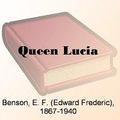CHAPTER 11, part 11
Mrs Weston could not bear not to announce this herself. "To my Elizabeth," she said. "Elizabeth came to me this morning. 'May I speak to you a minute, ma'am?' she asked, and I thought nothing more than that perhaps she had broken a tea-cup. 'Yes,' said I quite cheerfully, 'and what have you come to tell me?'" It was getting almost too tragic and Olga broke in.
"Let's try to forget all about it, for an hour or two," she said. "It was nice of you all to take pity on me and come and have dinner, otherwise I should have been quite alone. If there's one thing I cannot bear it's being alone in the evening. And to think that anybody chooses to be alone when he needn't! Look at that wretch there," and she pointed to Georgie, "who lives all by himself instead of marrying. Liking to be alone is the worst habit I know; much worse than drink." "Now do leave me alone," said Georgie. "I won't, my dear, and when dinner is over Mrs Weston and I are going to put our heads together, and when you come out we shall announce to you the name of your bride. I should put a tax of twenty shillings on the pound on all bachelors; they should all marry or starve." Suddenly she turned to Colonel Boucher.
"Oh, Colonel," she said. "What have I been saying? How dreadfully stupid of me not to remember that you were a bachelor too. But I wouldn't have you starve for anything. Have some more fish instantly to shew you forgive me. Georgie change the subject you're always talking about yourself." Georgie turned with admirable docility to Mrs Weston.
"It's too miserable for you," he said. "How will you get on without Elizabeth? How long has she been with you?" Mrs Weston went straight back to where she had left off.
"So I said, 'What have you come to tell me?' quite cheerfully, thinking it was a tea-cup. And she said, 'I'm going to be married, ma'am,' and she blushed so prettily that you'd have thought she was a girl of twenty, though she was seventeen when she came to me,--no, she was just eighteen, and that's fifteen years ago, and that makes her thirty-three. 'Well, Elizabeth,' I said, 'you haven't told me yet who it is, but whether it's the Archbishop of Canterbury or the Prince of Wales--for I felt I had to make a little joke like that--I hope you'll make him as happy as you've made me all these years.'" "You old darling," said Olga. "I should have gone into hysterics, and forbade the banns." "No, Miss Bracely, you wouldn't," said Mrs Weston, "you'd have been just as thankful as me, that she'd got a good husband to take care of and to be taken care of by, because then she said, 'Lor ma'am, it's none of they--not them great folks. It's the Colonel's Atkinson.' You ask the Colonel for Atkinson's character, Miss Bracely, and then you'd be just as thankful as I was."

